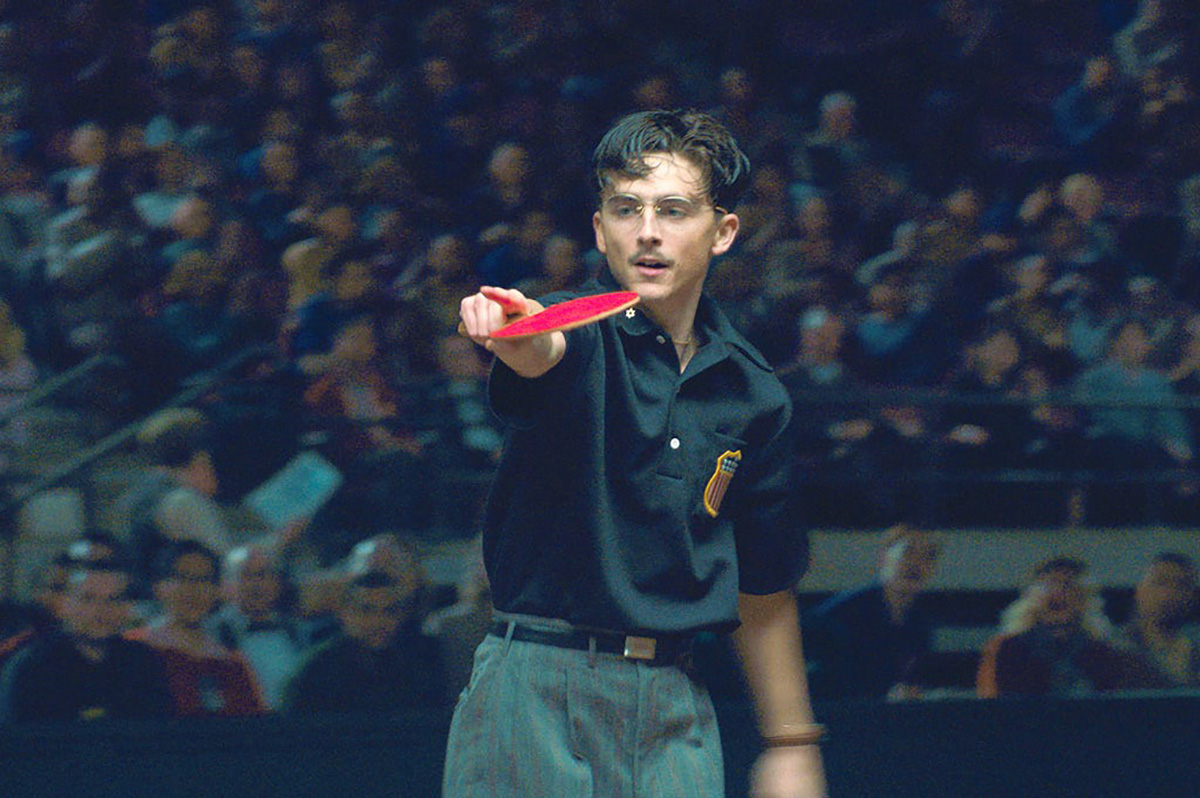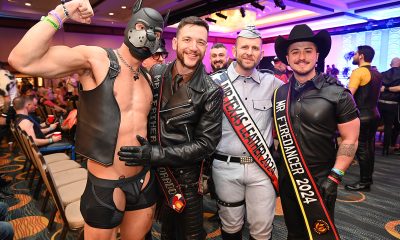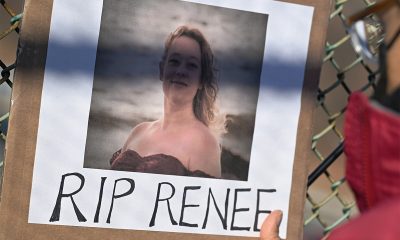Movies
What to watch this fall
What to watch this fall

It might be too soon to get excited about the movies we know are coming later in the year – like the first installment of the big-screen adaptation of “Wicked” or Pedro Almodóvar’s first English language movie “The Room Next Door” – but that doesn’t mean there’s still not plenty to look forward to as their time draws nearer. As always, we’ve compiled a preview of the most interesting LGBTQ and related content coming to movie and TV screens over the weeks ahead, so get ready to plan out your own watchlist as you keep reading below.
“The English Teacher” (Hulu, now streaming): In its publicity blurb, we’re told that educators being forced to navigate “a lot of bullshit” as a result of the ongoing culture wars is a theme that runs “subtly” through this new workplace comedy created by and starring Brian Jordan Alvarez, which is putting it mildly to say the least. Centering on an Austin high school teacher who comes under fire after a student sees him making out with his boyfriend at school, it’s a giddily up-front social satire that skewers not only the hypersensitivity of our current era but the counter-productive absurdity of an education system more concerned with placating political pressures than passing on knowledge; it’s already emerged as a critical darling among the new shows of the Fall Season – which is great news for Alvarez, a talented performer (best known as Jack’s husband-to-be in the rebooted “Will and Grace” and his viral video content on Instagram and TikTok) overdue for the mainstream spotlight.
“Lover Of Men: The Untold Story of Abraham Lincoln” (theaters, now playing; streaming/VOD, TBA this fall): Earnest, passionate, yet delivered with a light touch, this sure-to-be-controversial new doc addresses the much-speculated question of our iconic 16th president’s sexuality with a trove of well-documented evidence, presented by a host of respected historians and bolstered by amusingly modernistic re-enactments of the Great Emancipator’s supposed intimate liaisons with various men during key parts of his life. More than that, it ties its narrative to the way America’s attitudes and acceptance of LGBTQ people has evolved into contemporary times while also discrediting many modern assumptions about the ways the community has been treated in the past. It may not convince the die-hard doubters, but this polished and politically hopeful effort from filmmaker Shaun Peterson is as hard to dismiss as it is entertaining, and it definitely belongs on your watch list.
“Seeking Mavis Beacon” (theaters, Sept. 13): After a limited release on Sept. 6, this documentary expands nationwide this week with a “DIY detective story” about the search for the unknown and un-credited real-life model whose image was used as the face of “Mavis Beacon Teaches Typing” – a widely used instructional computer typing program launched in 1987 – that serves as a launch pad to explore a whole spectrum of sociological and philosophical nuances related to race, ethical marketing, and the impact of technology on culture and communication. With two queer women of color – director Jazmin Jones and associate producer Olivia McKayla Ross – leading the onscreen investigation, it’s an unusual and thought-provoking think piece that is as entertaining as it is enlightening.
“The Critic” (theaters, Sept. 13): Venerated queer elder and acting legend Ian McKellen returns to the screen in this deliciously dark tale of period intrigue from director Anand Tucker and writer Patrick Marber, in which a notoriously poison-penned theater critic (McKellen) in 1934 London attempts to preserve his career by manipulating an ambitious young actress (Gemma Arterton) into a sinister scheme to influence his paper’s new editor (Mark Strong). Lush costumes and period settings, not to mention an assortment of top-notch thespians that also includes Alfred Enoch, Ben Barnes, and the always-exquisite Lesley Manville, all make this grimly macabre morality tale about the dangers of an unbridled ego an unmistakable product of the UK – and it’s likely fans of “BritTV” style costume dramas will be most appreciative of its somewhat old-fashioned charms. Even so, another deftly over-the-top performance from McKellen and an underlying exploration of hazards of leading an openly queer life within a comfortably homophobic status quo are enough to make it interesting for other audiences, too.
“Unfightable” (theaters, Sept. 13 in New York and Sept. 20 in LA; Fuse TV, October TBA): Another new doc tells the story of transgender MMA fighter Alana McLaughlin, from her difficult upbringing and service in the US Special Forces, through her transition and search for community in Portland, to her decision to seek professional status in an arena notorious for its bias against transgender athletes. A real-life narrative highlighting the bravery it can take to assert one’s true identity, this must-see offering from director Marc J. Perez only screens in New York and LA this month, but debuts on Fuse TV in October.
“Will and Harper” (theaters, Sept. 13 / Netflix, Sept. 27): Yet another doc – or is it a non-fiction “road trip buddy movie?” – is set apart from the rest by the star power on the screen: namely Will Farrell, who goes on a cross-country drive with close friend Harper Steele, a writer he met on his first day working on “Saturday Night Live” in 1995. The twist? Steele, whom Farrell had only known as a man, had come out to him as a trans woman, and the trip is their way of forging a new path forward in their friendship “through laughter, tears, and many cans of Pringles.” Funny, intimate, honest, and heartfelt, this is one of those movies that has Hollywood abuzz, and with good reason – its unequivocal and highly visible exploration of trans identity comes with considerable industry clout in the form of its star (who is joined by fellow SNL alums like Seth Meyers, Tina Fey, Kristen Wiig, Colin Jost, Will Forte, Molly Shannon, Tim Meadows, and Paula Pell) and promotes unconditional love and acceptance toward trans people on the cusp of an election in which their rights and protections are very much at stake. Needless to say, this one should be near the top of your watch list.
“My Old Ass” (theaters, limited Sept. 13, wide Sept. 27): Just in time for the new psychedelic revolution comes this comical coming-of-age story in which free-spirited Elliott (Maisy Stella) takes an 18th birthday mushroom trip and finds herself face-to-face with her own 39-year-old self (Aubrey Plaza). Her “old ass” has some pretty strong opinions about what her younger self should and shouldn’t be doing, and doesn’t hesitate to deliver them in between wisecracks – causing Elliott to second-guess everything she thought she knew about family, love and what increasingly appears to be a transformative summer ahead. Written and directed by Megan Park, and also featuring Percy Hynes White, Maddie Ziegler, and Kerrice Brooks, this one is notable for featuring a bisexual central character, which is more than enough for us to put it on our list.
“How to Die Alone” (Hulu, Sept. 13): In this comedy series co-created by and starring Natasha Rothwell, Mel is a “broke, fat, Black JFK airport employee who’s never been in love and forgotten how to dream” – until an accident leads to a near-death experience. Jarred into a new outlook on life, she throws herself into a quest to go out and start living by any means necessary. Rothwell’s strong talents are enough to bring us to the table, but out gay co-star Conrad Ricamora (“How to Get Away With Murder,” “Fire Island”), as Mel’s best friend, definitely ups our interest level for this promising new entry.
“Agatha All Along” (Disney +, Sept. 18): We all know Marvel has been struggling to please its fans with its ambitious slate of TV content, but one hands-down winner for the titanic franchise was certainly the imaginative and ultimately powerful “WandaVision” – and this new miniseries, which stems directly from that critically lauded entry into the MCU canon, is breathlessly anticipated as a consequence. It follows the further misadventures of villainous Agatha Harkness (Kathryn Hahn), who (according to the official synopsis) “finds herself down and out of power after a suspicious goth teen [Joe Locke, ‘Heartstopper’] helps break her free” from the spell that trapped her at the conclusion of the former series. When he asks her to take him down the legendary “Witches’ Road,” a series of dangerous magical trials that might help her restore her powers, her interest is piqued, so the pair gathers a “desperate coven” and sets off on the treacherous journey together. Hahn’s reprisal of her fabulously campy supervillain role is likely to be the main attraction, but including the adorable Locke as her gay new teen familiar is a brilliantly irresistible touch.
“Monsters: The Lyle and Erik Menendez Story” (Netflix, Sept.19): Ryan Murphy and Ian Brennan’s true-crime anthology series “Monster” follows up its award-winning “Dahmer” saga by exploring the story of the real-life titular brothers, convicted in 1996 for the murders of their parents, José and Mary Louise “Kitty” Menendez – successfully prosecuted on the argument that they were motivated by greed for the family fortune despite the brothers’ claims of lifelong physical, emotional, and sexual abuse. It was a shocking, heavily publicized case, launching a surge in audience fascination with true crime, and let’s face it – nobody has quite the same golden touch in getting to the humanity behind these kinds of lurid tabloid tales as the prolific Murphy. It’s a must-watch, you can count on it – though if it’s anywhere near as disturbing as the show’s inaugural season, it probably won’t be a binge-watch. Javier Bardem and Chloë Sevigny play the parents, with relative newcomers Cooper Koch and Nicholas Alexander Chavez as the boys.
“Brilliant Minds” (NBC, Sept. 23) Out gay actor Zachary Quinto stars in this new medical procedural, loosely based on the life and work of Dr. Oliver Sacks, the famed late doctor whose work helped reconfigure the way we understand and treat neurological disorders – but while the real Sacks, though gay, didn’t come out until late in life, the series “re-imagines” his story into modern New York, giving Quinto’s version of the doc the chance to not only be open about his sexuality, but to use some unorthodox practices to help his patients. It might sound a bit forced, but Quinto is always an interesting actor to watch, and any chance to get queer talent playing queer characters in queer stories is good enough to warrant a chance from us, too.
“Grotesquerie” (Sept. 25, FX): The season’s second Ryan Murphy show is this miniseries about a small community unsettled by a wave of heinous crimes – which feel to the town’s lead investigator (Niecy Nash) to be eerily personal. Struggling with issues at home (and her own inner demons), she enlists the aid of a journalist nun (Micaela Diamond) with a difficult past of her own; together, this mismatched team strings together clues as they find themselves snared in a sinister web that only seems to raise more questions than answers. Yes, that all sounds pretty vague and evokes “American Horror Story” vibes without revealing anything – but with Nash as its star and supporting players like Lesley Manville, Courtney B. Vance, and even Travis Kelce (yes, him) on the roster, it’s bound to be a good time.
“Joker: Folies a Deux” (theaters, Oct. 4): This sequel to 2019’s acclaimed “Joker” brings back both director Todd Phillips and star Joaquin Phoenix as failed comedian Arthur Fleck, continuing his re-imagined origin story into the iconic “Batman” villain as it introduces him to the “love of his life” – soon-to-be fellow villain Harley Quinn (Lady Gaga) – while incarcerated in Arkham Asylum. The mad mischief-makers naturally embark upon what’s described as “a doomed romantic misadventure,” and frankly, we don’t know much more than that. But the trailers look amazing, and there’s no question of Phoenix’s brilliance in a role he’s already made his own. Even without those encouragements, though, there’s nothing that’s going to stop fans of queer diva Gaga from flocking to the theater to see her take on a character she seems already to have been destined to play – and you can bet we’ll be among them.

“Smile 2” (theaters, Oct. 18): For horror fans, Halloween brings this sequel to the popular 2022 “death curse” chiller from filmmaker Parker Finn, this time following a global pop sensation (Naomi Scott) as she starts out on a new world tour, only to begin experiencing increasingly terrifying and inexplicable events. No, the premise doesn’t sound terribly original (and just as it didn’t in the first installment), but if Finn keeps the same level of visual and storytelling skills as the last time around, it’s sure to be a delightfully terrifying thrill ride for those who dare.
“Fanatical: The Catfishing of Tegan and Sara” (Hulu, Oct. 18): Our list closes with one final documentary, which chronicles the labyrinthine tale of how the influential queer indie rock band of the title fell victim to an insidious hacking scheme from a lone stalker, leading to an identity-theft and catfishing campaign that continued to terrorize both the two musicians and their global legion of fans for more than a decade. Tegan and Sara join documentary filmmaker and investigator Erin Lee Carr to unfold this real-world mystery is into “a thriller, a caper, a whodunnit, and an intimate personal journey rolled into one.” Sounds good to us!
Movies
Rise of Chalamet continues in ‘Marty Supreme’
But subtext of ‘American Exceptionalism’ sparks online debate

Casting is everything when it comes to making a movie. There’s a certain alchemy that happens when an actor and character are perfectly matched, blurring the lines of identity so that they seem to become one and the same. In some cases, the movie itself feels to us as if it could not exist without that person, that performance.
“Marty Supreme” is just such a movie. Whatever else can be said about Josh Safdie’s wild ride of a sports comedy – now in theaters and already racking up awards – it has accomplished exactly that rare magic, because the title character might very well be the role that Timothée Chalamet was born to play.
Loosely based on real-life table tennis pro Marty Reisman, who published his memoir “The Money Player” in 1974, this Marty (whose real surname is Mauser) is a first-generation American, a son of Jewish immigrant parents in post-WWII New York who works as a shoe salesman at his uncle’s store on the Lower East Side while building his reputation as a competitive table tennis player in his time off. Cocky, charismatic, and driven by dreams of championship, everything else in his life – including his childhood friend Rachel (Odessa A’zion), who is pregnant with his baby despite being married to someone else – takes a back seat as he attempts to make them come true, hustling every step of the way.
Inevitably, his determination to win leads him to cross a few ethical lines as he goes – such as stealing money for travel expenses, seducing a retired movie star (Gwyneth Paltrow), wooing her CEO husband (Kevin O’Leary) to sponsor him, and running afoul of the neighborhood mob boss (veteran filmmaker Abel Ferrara) – and a chain of consequences piles at his heels, threatening to undermine his success before it even has a chance to happen.
Filmed in 35mm and drenched in the visual style of the gritty-but-gorgeous “New Hollywood” cinema that Safdie – making his solo directorial debut without the collaboration of his brother Benny – so clearly seeks to evoke, “Marty Supreme” calls up unavoidable connections to the films of that era with its focus on an anti-hero protagonist trying to beat the system at its own game, as well as a kind of cynical amorality that somehow comes across more like a countercultural call-to-arms than a nihilistic social commentary. It’s a movie that feels much more challenging in the mid-2020s than it might have four or so decades ago, building its narrative around an ego-driven character who triggers all our contemporary progressive disdain; self-centered, reckless, and single-mindedly committed to attaining his own goals without regard for the collateral damage he inflicts on others in the process, he might easily – and perhaps justifiably – be branded as a classic example of the toxic male narcissist.
Yet to see him this way feels simplistic and reductive, a snap value judgment that ignores the context of time and place while invoking the kind of ethical purity that can easily blind us to the nuances of human behavior. After all, a flawed character is always much more authentic than a perfect one, and Marty Mauser is definitely flawed.
Yet in Chalamet’s hands, those flaws become the heart of a story that emphasizes a will to transcend the boundaries imposed by the circumstantial influences of class, ethnicity, and socially mandated hierarchy. His Marty is a person forging an escape path in a world that expects him to “know his place,” who is keenly aware of the anti-semitism and cultural conventions that keep him locked into a life of limited possibilities and who is willing to do whatever it takes to break free of them; and though he might draw our disapproval for the choices he makes, particularly with regard to his relationship with Rachel, he grows as he goes, navigating a character arc that is less interested in redemption for past sins than it is in finding the integrity to do better the next time – and frankly, that’s something that very few toxic male narcissists ever do.
In truth, it’s not surprising that Chalamet nails the part, considering that it’s the culmination of a project that began in 2018, when Safdie gave him Reisman’s book and suggested collaborating on a movie based on the story of his rise to success. The actor began training in table tennis, and continued to master it over the years, even bringing the necessary equipment to location shoots for movies like “Dune” so that he could perfect his skills – but physical skill aside, he always had what he needed to embody Marty. This is a character who knows what he’s got and is not ashamed to use it, who has the drive to succeed, the will to excel, and the confidence to be unapologetically himself while finding joy in the exercise of his talents, despite how he might be judged by those who see only ego. If any actor could be said to reflect those qualities, it’s Timothée Chalamet.
Other members of the cast also score deep impressions, especially A’zion, whose Rachel avoids tropes of victimhood to achieve her own unconventional character arc. Paltrow gives a remarkably vulnerable turn as the aging starlet who willingly allows Marty into her orbit despite the worldliness that tells her exactly what she’s getting into, while O’Leary embodies the kind of smug corporate venality that instantly positions him as the avatar for everything Marty is trying to escape. Queer fan-fave icons Fran Drescher and Sandra Bernhard also make small-but-memorable appearances, and real-life deaf table tennis player Koto Kawaguchi strikes a noble chord as the Japanese champion who becomes Marty’s de facto rival.
As for Safdie’s direction, it’s hard to find anything to criticize in his film’s visually stylish, sumptuously photographed (by Darius Khondji), and tightly paced delivery, which makes its two-and-a-half hour runtime fly by without a moment of drag.
It must be said that the screenplay – co-written by Safdie with Ronald Bronstein – leans heavily into an approach in which much of the plot hinges on implausible coincidences, ironic twists, and a general sense of orchestrated chaos that makes things occasionally feel a little too neat in the service of creating an outlandish “tall tale” narrative ; but let’s face it, life is like that sometimes, so it’s easy to overlook.
What might be more problematic, for some audiences, is Marty’s often insufferable – and occasionally downright ugly behavior. Yes, Chalamet infuses it all with humanizing authenticity, and the story is ultimately more about the character’s emotional evolution than it is about his winning at ping-pong, but it’s impossible not to read a subtext of American Exceptionalism into his winner-takes-all climb to victory – which is why “Marty Supreme,” for all its critical acclaim, is the subject of heated debate and outrage on social media right now.
As for us, we’re not condoning anything Marty does or says as he hustles his way to the winner’s circle. All we’re saying is that Timothée Chalamet has become an even better actor since he captured our attention (and a lot of gay hearts) in “Call Me By Your Name.”
And that’s saying a lot, because he was pretty great, even then.
Movies
A Shakespearean tragedy comes to life in exquisite ‘Hamnet’
Chloe Zhao’s devastating movie a touchstone for the ages

For every person who adores Shakespeare, there are probably a dozen more who wonder why.
We get it; his plays and poems, composed in a past when the predominant worldview was built around beliefs and ideologies that now feel as antiquated as the blend of poetry and prose in which he wrote them, can easily feel tied to social mores that are in direct opposition to our own, often reflecting the classist, sexist, and racist patriarchal dogma that continues to plague our world today. Why, then, should we still be so enthralled with him?
The answer to that question might be more eloquently expressed by Chloe Zhao’s “Hamnet” – now in wide release and already a winner in this year’s barely begun awards season – than through any explanation we could offer.
Adapted from the novel by Maggie O’Farrell (who co-wrote the screenplay with Zhao), it focuses its narrative on the relationship between Will Shakespeare (Paul Mescal) and his wife Agnes Hathaway (Jessie Buckley), who meet when the future playwright – working to pay off a debt for his abusive father – is still just a tutor helping the children of well-to-do families learn Latin. Enamored from afar at first sight, he woos his way into her life, and, convincing both of their families to approve the match (after she becomes pregnant with their first child), becomes her husband. More children follow – including Hamnet (Jacobi Jupe), a “surprise” twin boy to their second daughter – but, recognizing Will’s passion for writing and his frustration at being unable to follow it, Agnes encourages him to travel to London in order to immerse himself in his ambitions.
As the years go by, Agnes – aided by her mother-in-law (Emily Watson) and guided by the nature-centric pagan wisdom of her own deceased mother – raises the children while her husband, miles away, builds a successful career as the city’s most popular playwright. But when an outbreak of bubonic plague results in the death of 11-year-old Hamnet in Will’s absence, an emotional wedge is driven between them – especially when Agnes receives word that her husband’s latest play, titled “Hamlet,” an interchangeable equivalent to the name of their dead son, is about to debut on the London stage.
There is nothing, save the bare details of circumstance around the Shakespeare family, that can be called factual about the narrative told in “Hamnet.” Records of Shakespeare’s private life are sparse and short on context, largely limited to civic notations of fact – birth, marriage, and death announcements, legal documents, and other general records – that leave plenty of space in which to speculate about the personal nuance such mundane details might imply. What is known is that the Shakespeares lost their son, probably to plague, and that “Hamlet” – a play dominated by expressions of grief and existential musings about life and death – was written over the course of the next five years. Shakespearean scholars have filled in the blanks, and it’s hard to argue with their assumptions about the influence young Hamnet’s tragic death likely had over the creation of his father’s masterwork. What human being would not be haunted by such an event, and how could any artist could avoid channeling its impact into their work, not just for a time but for forever after?
In their screenplay, O’Farrell and Zhao imagine an Agnes Shakespeare (most records refer to her as “Anne” but her father’s will uses the name “Agnes”) who stands apart from the conventions of her town, born of a “wild woman” in the woods and raised in ancient traditions of mysticism and nature magic before being adopted into her well-off family, who presents a worthy match and an intellectual equal for the brilliantly passionate creator responsible for some of Western Civilization’s most enduring tales. They imagine a courtship that would have defied the customs of the time and a relationship that feels almost modern, grounded in a love and mutual respect that’s a far cry from most popular notions of what a 16th-century marriage might look like. More than that, they imagine that the devastating loss of a child – even in a time when the mortality rate for children was high – might create a rift between two parents who can only process their grief alone. And despite the fact that almost none of what O’Farrell and Zhao present to us can be seen, at best, as anything other than informed speculation, it all feels devastatingly true.
That’s the quality that “Hamnet” shares with the ever-popular Will Shakespeare; though it takes us into a past that feels as alien to us as if it took place upon a different planet, it evokes a connection to the simple experience of being human, which cuts through the differences in context. Just as the kings, heroes, and fools of Shakespeare’s plays express and embody the same emotional experiences that shape our own mundane modern lives, the film’s portrayal of these two real-life people torn apart by personal tragedy speaks directly to our own shared sense of loss – and it does so with an eloquence that, like Shakespeare’s, emerges from the story to make it feel as palpable as if their grief was our own.
Yes, the writing and direction – each bringing a powerfully feminine “voice” to the story – are key to the emotional impact of “Hamnet,” but it’s the performances of its stars that carry it to us. Mescal, once more proving himself a master at embodying the kind of vulnerable masculine tenderness that’s capable of melting our hearts, gives us an accessible Shakespeare, driven perhaps by a spark of genius yet deeply grounded in the tangible humanity that underscores the “everyman” sensibility that informs the man’s plays. But it’s Buckley’s movie, by a wide margin, and her bold, fierce, and deeply affecting performance gives voice to a powerful grief, a cry against the injustice and cruelty of what we fumblingly call “fate” that resonates deep within us and carries our own grief, over losses we’ve had and losses we know are yet to come, along with her on the journey to catharsis.
That’s the word – “catharsis” – that defines why Shakespeare (and by extension, “Hamnet”) still holds such power over the imagination of our human race all these centuries later. The circumstantial details of his stories, wrapped up in ancient ideologies that still haunt our cultural imagination, fall away in the face of the raw expression of humanity to which his characters give voice. When Hamlet asks “to be or not to be?,” he is not an old-world Danish Prince contemplating revenge against a traitor who murdered his father; he is Shakespeare himself, pondering the essential mystery of life and death, and he is us, too.
Likewise, the Agnes Shakespeare of “Hamnet” (masterfully enacted by Buckley) embodies all our own sorrows – past and future, real and imagined – and connects them to the well of human emotion from which we all must drink; it’s more powerful than we expect, and more cleansing than we imagine, and it makes Zhao’s exquisitely devastating movie into a touchstone for the ages.
We can’t presume to speak for Shakespeare, but we are pretty sure he would be pleased.
Movies
‘Hedda’ brings queer visibility to Golden Globes
Tessa Thompson up for Best Actress for new take on Ibsen classic

The 83rd annual Golden Globes awards are set for Sunday (CBS, 8 p.m. EST). One of the many bright spots this awards season is “Hedda,” a unique LGBTQ version of the classic Henrik Ibsen story, “Hedda Gabler,” starring powerhouses Nina Hoss, Tessa Thompson and Imogen Poots. A modern reinterpretation of a timeless story, the film and its cast have already received several nominations this awards season, including a Globes nod for Best Actress for Thompson.
Writer/director Nia DaCosta was fascinated by Ibsen’s play and the enigmatic character of the deeply complex Hedda, who in the original, is stuck in a marriage she doesn’t want, and still is drawn to her former lover, Eilert.
But in DaCosta’s adaptation, there’s a fundamental difference: Eilert is being played by Hoss, and is now named Eileen.
“That name change adds this element of queerness to the story as well,” said DaCosta at a recent Golden Globes press event. “And although some people read the original play as Hedda being queer, which I find interesting, which I didn’t necessarily…it was a side effect in my movie that everyone was queer once I changed Eilert to a woman.”
She added: “But it still, for me, stayed true to the original because I was staying true to all the themes and the feelings and the sort of muckiness that I love so much about the original work.”
Thompson, who is bisexual, enjoyed playing this new version of Hedda, noting that the queer love storyline gave the film “a whole lot of knockoff effects.”
“But I think more than that, I think fundamentally something that it does is give Hedda a real foil. Another woman who’s in the world who’s making very different choices. And I think this is a film that wants to explore that piece more than Ibsen’s.”
DaCosta making it a queer story “made that kind of jump off the page and get under my skin in a way that felt really immediate,” Thompson acknowledged.
“It wants to explore sort of pathways to personhood and gaining sort of agency over one’s life. In the original piece, you have Hedda saying, ‘for once, I want to be in control of a man’s destiny,’” said Thompson.
“And I think in our piece, you see a woman struggling with trying to be in control of her own. And I thought that sort of mind, what is in the original material, but made it just, for me, make sense as a modern woman now.”
It is because of Hedda’s jealousy and envy of Eileen and her new girlfriend (Poots) that we see the character make impulsive moves.
“I think to a modern sensibility, the idea of a woman being quite jealous of another woman and acting out on that is really something that there’s not a lot of patience or grace for that in the world that we live in now,” said Thompson.
“Which I appreciate. But I do think there is something really generative. What I discovered with playing Hedda is, if it’s not left unchecked, there’s something very generative about feelings like envy and jealousy, because they point us in the direction of self. They help us understand the kind of lives that we want to live.”
Hoss actually played Hedda on stage in Berlin for several years previously.
“When I read the script, I was so surprised and mesmerized by what this decision did that there’s an Eileen instead of an Ejlert Lovborg,” said Hoss. “I was so drawn to this woman immediately.”
The deep love that is still there between Hedda and Eileen was immediately evident, as soon as the characters meet onscreen.
“If she is able to have this emotion with Eileen’s eyes, I think she isn’t yet because she doesn’t want to be vulnerable,” said Hoss. “So she doesn’t allow herself to feel that because then she could get hurt. And that’s something Eileen never got through to. So that’s the deep sadness within Eileen that she couldn’t make her feel the love, but at least these two when they meet, you feel like, ‘Oh my God, it’s not yet done with those two.’’’
Onscreen and offscreen, Thompson and Hoss loved working with each other.
“She did such great, strong choices…I looked at her transforming, which was somewhat mesmerizing, and she was really dangerous,” Hoss enthused. “It’s like when she was Hedda, I was a little bit like, but on the other hand, of course, fascinated. And that’s the thing that these humans have that are slightly dangerous. They’re also very fascinating.”
Hoss said that’s what drew Eileen to Hedda.
“I think both women want to change each other, but actually how they are is what attracts them to each other. And they’re very complimentary in that sense. So they would make up a great couple, I would believe. But the way they are right now, they’re just not good for each other. So in a way, that’s what we were talking about. I think we thought, ‘well, the background story must have been something like a chaotic, wonderful, just exploring for the first time, being in love, being out of society, doing something slightly dangerous, hidden, and then not so hidden because they would enter the Bohemian world where it was kind of okay to be queer and to celebrate yourself and to explore it.’”
But up to a certain point, because Eileen started working and was really after, ‘This is what I want to do. I want to publish, I want to become someone in the academic world,’” noted Hoss.
Poots has had her hands full playing Eileen’s love interest as she also starred in the complicated drama, “The Chronology of Water” (based on the memoir by Lydia Yuknavitch and directed by queer actress Kristen Stewart).
“Because the character in ‘Hedda’ is the only person in that triptych of women who’s acting on her impulses, despite the fact she’s incredibly, seemingly fragile, she’s the only one who has the ability to move through cowardice,” Poots acknowledged. “And that’s an interesting thing.”




















